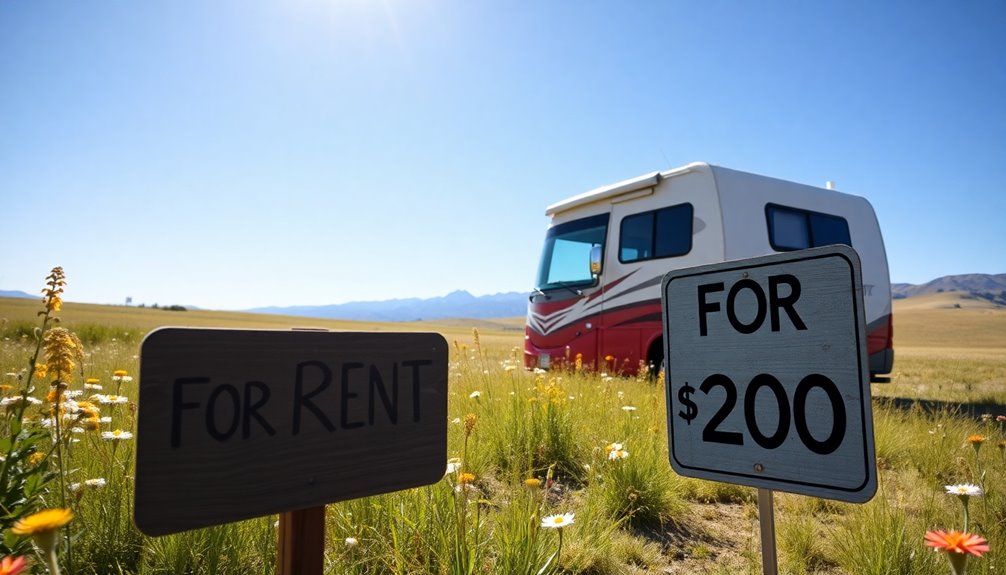An RV rental for $200 a month might seem like a dream deal, but it's often too good to be true. Typically, RV rentals range from $1,450 to $9,500 monthly, with hidden fees lurking behind low base rates. You could face extra charges for mileage, cleaning, and even security deposits. It's important to check what's included in that price, as additional costs can quickly add up. If you think you've found a bargain, you should investigate the terms to avoid surprises. Find out more about what to watch for and make the smartest decision possible.
Understanding RV Rental Costs
When it comes to understanding RV rental costs, it's vital to recognize the wide range of prices you'll encounter. The average monthly rental cost for RVs typically ranges from $1,450 to $9,500, depending on the type and amenities.
For example, small campers might start at around $1,500 per month, while luxury Class A motorhomes can soar to between $4,000 and 12,500.
If you're considering long-term rentals, you might find significant savings, as many rental companies offer discounts for extended stays. Additionally, budgeting tools such as budgeting apps can help you manage your finances effectively during your rental period. Using tools like YNAB (You Need A Budget) can greatly enhance your financial planning and spending prioritization.
However, it's important to factor in additional costs that can impact your overall expenditure. Mileage fees, fuel consumption, and campground fees can add up quickly, turning what seems like a deal into a financial burden. Regular reviews of savings and investment performance support informed decision-making regarding your budget.
A rental offer of $200 a month is likely unrealistic for most RV types, as it falls far below typical market rates.
To avoid surprises, always inquire about potential additional costs when exploring your options. Understanding these factors will help you make an informed decision and find an RV rental that fits your budget and needs.
Typical RV Rental Prices
When you look at typical RV rental prices, you'll notice a wide range from $50 to $450 per night, depending on the type and features. Additionally, utilizing price comparison tools can help you find the best deals on RV rentals. Seasonal price changes can also impact what you pay, and hidden fees might sneak in to inflate your total cost. It's crucial to understand these factors to make informed decisions about your RV rental options. Moreover, many consumers have saved significantly using Google Shopping to compare prices across different platforms. Additionally, exploring budgeting apps for investment tracking can help manage your finances effectively while planning for your trip.
Average Nightly Rental Rates
Renting an RV can be an exciting way to explore the great outdoors, but understanding the average nightly rental rates is essential for budgeting your trip. Typically, average RV rental prices range from $75 to $300 per night, depending on the class and amenities of the vehicle.
If you're considering a Class A motorhome, be prepared for higher rental costs, averaging between $150 to $450 per night. Class C RVs offer a good balance of cost and space, with nightly rates ranging from $100 to $400. For a more budget-friendly option, Class B campervans generally average around $100 to $350 per night.
If you prefer towable options, travel trailers can be a great choice, usually costing between $50 to $200 per night. Fifth-wheel rentals typically range from $60 to $300 per night.
Keep in mind that seasonal demand plays a significant role in pricing; peak seasons, like summer, can lead to higher rental costs. By understanding these average nightly rates, you'll be better equipped to plan your RV adventure without breaking the bank.
Seasonal Price Variations
Seasonal price variations can greatly impact your RV rental budget. During peak seasons, like summer months and major holidays, RV rental prices often soar due to increased seasonal demand.
You might find that a Class A motorhome costs up to $1,000 per night, while smaller options, such as pop-up campers, can start as low as $50 per night. If you're looking at monthly rentals, expect averages between $1,450 and $9,500, depending on the RV class and amenities.
Long-term rentals can provide significant savings. Many rental companies offer discounts for monthly bookings, making them an attractive option if you're planning an extended trip.
Keep in mind that urban locations generally have higher rental prices compared to rural areas, reflecting local demand and available amenities.
Hidden Fees Explained
Steering through the costs of RV rentals often reveals unexpected hidden fees that can quickly add up. While you might see an enticing $200 monthly rental, the reality can be quite different.
Typical RV rental prices range from $1,450 to $9,500 monthly, making such an offer seem too good to be true.
You'll likely encounter additional charges that inflate your total rental cost. Mileage fees, which can run between $0.30 and $0.45 per mile, are common, along with generator usage fees.
Cleaning fees can also hit your wallet hard, ranging from $100 to $300. Many rental companies require a security deposit, often between $500 and $3,000, which isn't included in the advertised price.
Don't forget about extra costs for amenities like kitchen kits or camping gear, adding another $50 to $150 to your bill.
Hidden fees, such as service charges (5% to 20% of the booking subtotal) and late return fees ($50 to $300), can sneak up on you. Always read the fine print and calculate these hidden fees to understand the true cost of your RV rental.
Factors Influencing Rental Rates
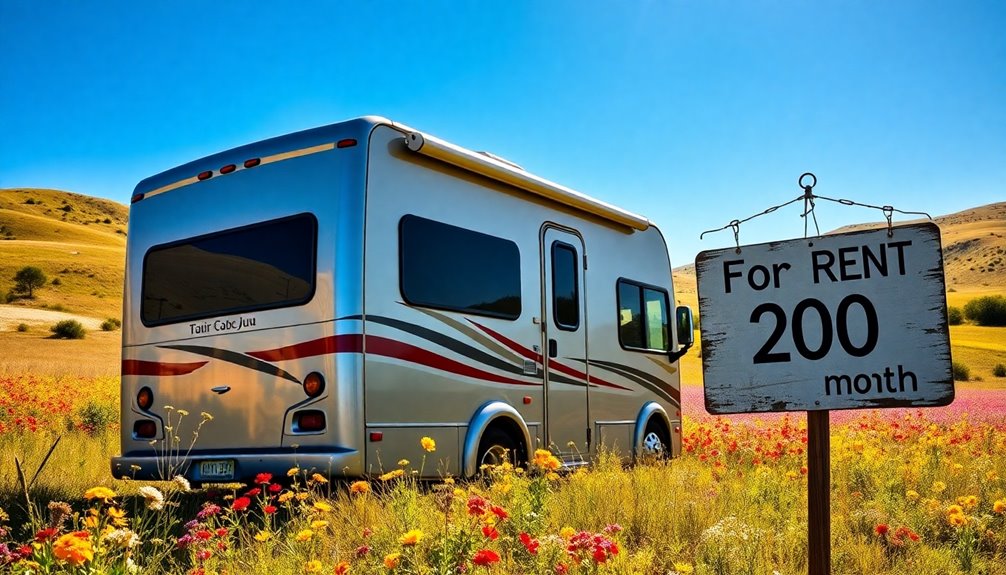
When you're evaluating RV rentals, several key factors can influence the rates you encounter. The type of RV you choose plays a vital role; for instance, Class A motorhomes average around $306 per night, while Class B campervans typically cost about $232 per night. Additionally, utilizing price comparison tools can help you find the best deals available.
Seasonal demand is another important factor, with peak times like summer and major holidays driving rental fees higher than during off-peak periods. Additionally, understanding the impact of expense categorization can help ensure that your rental costs align with your budget.
The age and condition of the RV also affect the cost to rent. Newer, well-maintained models generally command higher rental fees than older ones. Additionally, location matters; urban areas often see increased rates due to higher demand and available amenities.
Moreover, it's important to take into account the total costs. Rental agencies may advertise attractive base rates, but additional expenses can quickly add up. Mileage fees, cleaning fees, and optional add-ons can greatly impact your overall budget. Utilizing tools like expense tracking tools can help you manage these costs effectively.
Understanding these factors influencing rental rates guarantees you're fully aware of what you're getting into before signing any rental agreement. By doing your research, you can avoid surprises and make a more informed decision about your RV rental experience.
Hidden Fees and Charges
When renting an RV for $200 a month, you might be surprised by the hidden fees that can quickly add up. From mileage charges to insurance and hefty security deposits, these costs can transform that seemingly low rental rate into a much larger expense. It's essential to read the fine print and be aware of all potential charges before you hit the road. Additionally, implementing financial organization strategies can help you manage these unexpected costs effectively. Utilizing features like timely payment alerts can assist you in keeping track of these expenses and ensuring that you stay within your budget. Moreover, understanding clear payment terms can aid in preventing misunderstandings regarding additional fees.
Common Additional Fees
Renting an RV for just $200 a month might sound appealing, but be wary of the additional fees that can quickly add up. Many rental companies impose extra charges that can considerably inflate your RV rental costs.
For instance, mileage fees usually range from $0.30 to $0.40 per mile if you exceed the included mileage allowance. If you plan to use the generator, keep in mind that limited hours per day could lead to extra charges, too.
Cleaning fees can also be a surprise, costing anywhere from $100 to over $300 if you don't return the RV in a clean condition. Don't forget about service charges, which typically range from 5% to 20% of your booking subtotal, further increasing your total rental cost.
Additionally, a security deposit, which can be between $500 to $3,000, is often required upfront. This deposit is only refundable if you return the RV in good condition, adding to your initial expenses.
Mileage Charges Explained
Mileage charges can catch you off guard if you're not prepared. When renting an RV, you might be offered a daily mileage allowance, usually around 100-150 miles. If you exceed included mileage, extra fees can rapidly add up. Typically, mileage charges range from $0.30 to $0.45 per mile, and for a long trip, these additional fees can greatly increase your total rental costs.
It's essential to calculate your expected travel distance before hitting the road. For instance, a 1,000-mile trip could lead to an extra $300 to $450 in mileage fees alone, depending on your rental terms.
To avoid these pitfalls, always inquire about the mileage policies of the rental company. Different companies have varying rules regarding mileage charges, and understanding these can save you from unpleasant surprises.
Some rental companies do offer unlimited mileage options for a higher base rate, which might be more economical for longer journeys. Be sure to weigh the costs and benefits of both choices to find what's best for your travel plans.
Planning ahead will help you enjoy your RV adventure without worrying about unexpected expenses.
Insurance and Deposits
Understanding the costs of RV rentals goes beyond just mileage charges; insurance and deposits can add considerable hidden fees.
When you rent an RV, expect to put down a security deposit that can range from $500 to $3,000. This amount is refundable if the RV returns in good condition, but it certainly bumps up your initial rental cost.
Insurance is another key factor. While some rental agreements may include basic insurance, you might find that additional coverage options come with extra fees. This can greatly affect your overall rental cost, especially if you want peace of mind on the road.
Don't forget about those sneaky hidden fees. Mileage charges typically range from $0.30 to $0.45 per mile if you exceed the included limit, and these can quickly add up on longer trips.
Additionally, cleaning fees can hit you with charges of $100 to $300 or more if you don't return the RV in a clean state. Optional add-ons like kitchen kits or bedding can further inflate your expenses, so always read the rental agreements carefully.
Monthly vs. Daily Rentals
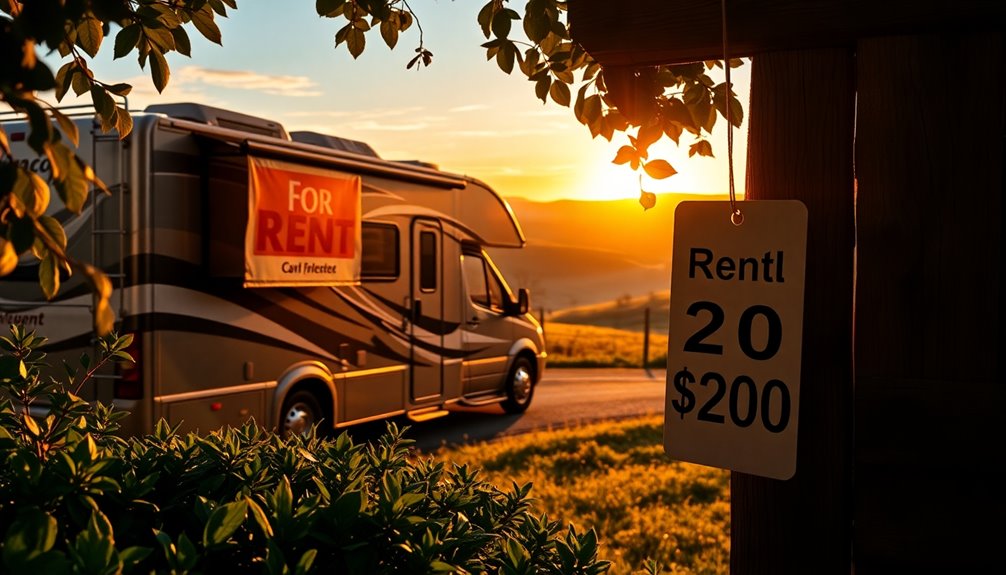
When it comes to choosing between monthly and daily RV rentals, the cost difference can considerably impact your travel budget. If you're planning an extended RV trip, long-term rentals often prove far more economical. Monthly RV rentals typically range from $1,450 to $9,500, depending on the size and RV class. In contrast, daily rentals may average between $75 and $300 per night, which adds up quickly.
Consider these factors when deciding:
- Savings Potential: Monthly rentals often come with discounts, like a free day for every week booked. Additionally, tracking your expenses with expense tracking apps can help you maximize these savings. Utilizing these tools can enhance your financial awareness and assist in identifying unnecessary expenses that could be cut from your budget.
- Flexibility: Daily rentals might suit short trips or spontaneous adventures, but they can lead to extra expenses.
- Comfort: A long-term rental allows you to settle in, making RV camping feel more like home.
Understanding "How Much Does It Cost" for your chosen rental will help you weigh the benefits of a monthly versus daily rate. Additionally, utilizing expense management apps can assist in tracking rental costs effectively.
If you're looking for a budget-friendly option, remember that while a $200 monthly rate sounds tempting, it's likely unrealistic compared to standard prices.
Evaluating the $200 Offer
When you see an RV rental for just $200 a month, it's essential to contemplate any hidden fees that could inflate the total cost.
You'll want to reflect on how long you plan to rent and whether the RV's condition meets your needs.
Evaluating these factors will help you avoid surprises and guarantee you're making a smart choice.
Hidden Fees Explained
While the allure of a $200 monthly RV rental is hard to resist, it's essential to dig deeper and uncover the potential hidden fees that can quickly inflate your overall costs. You might find that the initial offer doesn't cover everything you need.
Here are some common additional costs to watch out for:
- Mileage Fees: Many rentals have limits on mileage, with fees typically ranging from $0.30 to $0.40 per mile beyond those limits.
- Security Deposit: Prepare for a security deposit that can range from $500 to $3,000, greatly increasing your upfront costs.
- Cleaning Fees: If you don't return the RV clean, expect cleaning fees between $100 and $300+.
Additionally, make sure to clarify if the $200 offer includes insurance and any service fees, as these can add 5% to 20% to your total.
Optional add-ons like kitchen kits or camping gear may also incur extra charges, usually between $50 to $150.
Rental Duration Implications
Understanding the rental duration implications of a $200 monthly RV offer is essential for making an informed decision. At first glance, this deal seems extraordinarily low compared to typical monthly rentals, which average between $1,450 and $9,500. This stark difference raises suspicious flags about potential limitations or hidden fees that could arise during your rental period.
When considering a long-term rental, it's vital to assess what's included in the $200 offer. Are there mileage limits? What amenities are provided? Often, lower rental rates come with strict restrictions that could lead to additional costs, undermining the affordability of the deal.
Furthermore, you should inquire about maintenance responsibilities—who's accountable for repairs during your rental?
It's also wise to research the rental platform or owner behind this offer. If the deal seems too good to be true, it might carry risks associated with poor maintenance or other hidden implications.
RV Condition Considerations
Before jumping on the $200 monthly RV rental offer, you should carefully evaluate the condition of the vehicle. A price that low often signals potential issues. The RV might be an older model or one that needs significant maintenance, affecting its reliability and comfort during your trip.
Here are a few key things to inspect:
- Cleanliness and Wear: Check for any signs of wear and tear, both inside and out.
- Mechanical Issues: Look for any mechanical problems that could impact performance.
- Hidden Costs: Be aware of possible hidden costs, like high mileage fees or repairs not included in the rental agreement.
Additionally, reviewing customer feedback can provide insight into the RV's previous condition and performance. This way, you can avoid unexpected problems during your rental period.
Benefits of Long-Term Rentals
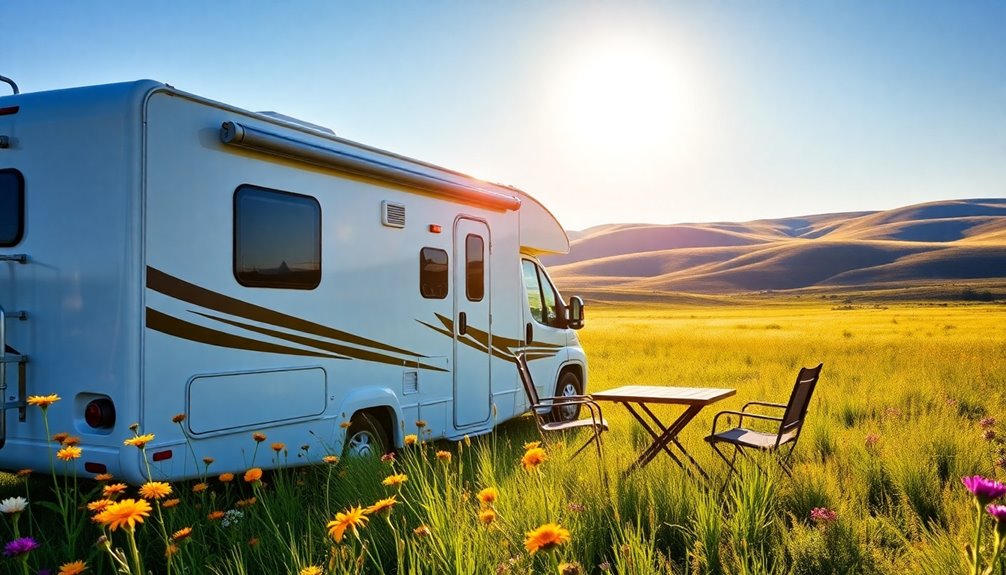
Long-term RV rentals often deliver substantial benefits that enhance your travel experience. One of the major perks is the significant savings compared to short-term rentals. With monthly costs averaging between $1,450 and $9,500, you'll find it much more economical than paying nightly rates.
Plus, many rental companies offer discounts for longer rentals, allowing you to save 10% on weekly bookings and up to 20% on monthly rentals.
By opting for long-term rentals, you can enjoy the comforts of home while traveling, which helps reduce stress associated with frequent hotel check-ins and check-outs. This setup also provides the flexibility in travel plans that you crave, enabling you to explore various locations more immersively without the constraints of traditional lodging.
Additionally, long-term RV rentals let you test the RV lifestyle before committing to a purchase. It's an excellent opportunity to assess your needs and preferences, ensuring you make informed decisions about future investments.
Embracing long-term rentals can truly transform your adventures, offering both financial benefits and a chance to enjoy travel on your own terms.
Alternative Rental Options
Exploring alternative rental options can open up new possibilities for your RV experience. While a $200 monthly rental seems tempting, it's essential to take into account what else is out there.
Many budget-friendly RV alternatives, like pop-up campers or travel trailers, might fit better into your plans, even if they typically exceed that price point.
Here are a few options to take into account:
- Peer-to-Peer Rental Platforms: Websites like RVshare or Outdoorsy can offer competitive pricing, but always check the vehicle's age, condition, and added fees.
- Local Rental Agencies: Look for RV Rentals Near you, where you might find better deals or packages that suit your needs.
- Cost Considerations: Remember that low base rates often come with additional charges for equipment, insurance, and cleaning fees, which can inflate your overall expenses.
Don't overlook these factors when evaluating your options. Even if the base rental cost seems low, understanding the complete costs to rent will help you make a more informed decision.
Ultimately, the right choice will align with your budget and enhance your adventure.
Tips for Budgeting Effectively
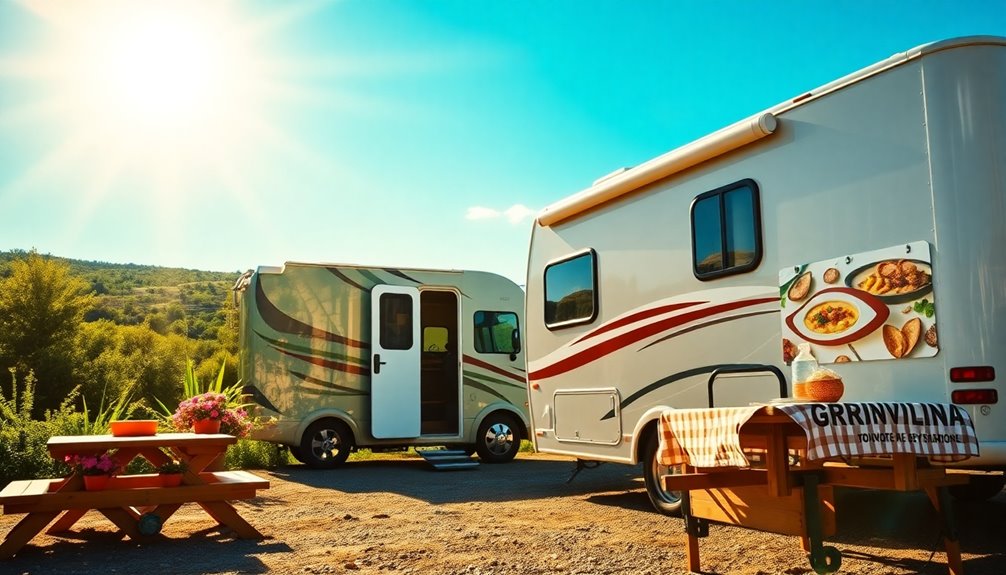
Budgeting effectively for your RV rental can make a significant difference in your overall experience. Start by determining the total cost of renting the RV, which often includes more than just the advertised monthly rate. While a $200 per month deal sounds enticing, it's essential to account for additional costs like mileage fees, cleaning fees, and insurance, which can quickly add up.
If you're considering long-term renting, look for discounts on RV rentals, as many companies provide better rates for extended stays. However, always verify the RV's condition and included amenities before committing to a low-cost option, as hidden issues can lead to extra fees down the line.
To maximize your budget, research and compare multiple rental platforms. This helps you find a fair price and avoid listings that may seem attractive but come with unexpected limitations or costs.
Additionally, consider booking during off-peak seasons, as this can lead to significant savings and better deals. By being thorough and proactive in your budgeting, you'll guarantee your RV rental experience is enjoyable and within your financial means.
Making an Informed Decision
When you come across an RV rental advertised for just $200 a month, it's crucial to dig deeper before making a decision. This price is considerably below the average monthly rental cost, which usually ranges from $1,450 to $9,500. You'll want to verify you're not falling for a too-good-to-be-true offer.
Consider the following before moving forward:
- RV Types: Lower rates might mean an older model or fewer amenities.
- Fees Associated: Don't overlook potential extra costs like mileage charges (often $0.30 to $0.40 per mile) and cleaning fees (ranging from $100 to $300+).
- Rental Services: Research the rental company or owner for reviews to avoid scams.
Make sure to verify the RV's condition and understand the rental terms. A seemingly good deal might come with hidden issues or limitations on usage.
Always set a mileage budget to manage unexpected fees. By taking these steps, you'll be better equipped to make an informed decision and avoid any financial pitfalls that could arise from an enticing but suspicious offer.
Conclusion
In the world of RV rentals, a $200 monthly rate can seem like a golden ticket, but it's essential to dig deeper. Like finding a diamond in the rough, you might encounter hidden fees or unexpected costs. Always weigh the pros and cons, and consider your needs before committing. By doing your research and budgeting wisely, you can make an informed decision that keeps your adventure enjoyable without breaking the bank. Happy travels!

